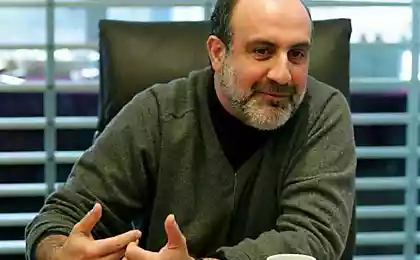511
One-on-one: 6 ways to get the employee of the truth
The head Know Your Company Claire Lew shares six ways to talk to the employee and understand what he really thinks about you and your company.
One day, about five years ago, my CEO asked me to talk one on one. The year was over, and he wanted to know that, in my opinion, the company needs to improve if he as a leader to become better. And he wanted to hear from me is what I think. But despite his assurances that he will be able to "handle the truth", I couldn't bring myself to say it like it is.
And the truth was that I wasn't sure about the overall development strategy of the company. I was concerned that some employees believed that they had been treated unfairly. But it seemed to me pointless to talk about it. I could not imagine that the CEO will listen to me and change something in the company. On the contrary, it seemed to me that this will only cause a negative reaction. So I thought better to remain silent.

I will never forget that feeling when you're hiding something. I prefer to keep silent because they do not believe in the possibility of some changes. I'll be honest: I'm not proud of my silence. Now, knowing all about the importance of the feedback with the head, I wouldn't do it. As CEO, I can imagine the frustration experienced my head, when a few months after this "Frank conversation" I resigned from the company.
From my own experience, I am very attentive to the conversations one-on-one with employees in my own company. I don't want my team members felt as I did then, being on the other side of the table. And I don't want to repeat the experience of my former boss, whose real feelings employees have a revelation.
And here's what you need to take to have the conversation tete-a-tete was held as openly as possible.
Make empathy your task
Every time during a conversation one on one I need to understand what the other person is feeling. Everything else fades into the background. During the conversation, I do not criticize the employee's performance, not saying that it is time for the project to reach a new level (for all this is a separate conversation). The conversation alone is priceless, the sacred time, to find out what the employee actually feels.
When you make compassion your mission, the whole nature of the conversation changed. You start to listen more. You begin to ask more thoughtful questions. You perceive yourself along with the employee, assuming you do not have answers to all the questions. Staff notice that you try to empathize with them, not just doing some of his conclusions. The conversation alone is less intimidating for the employee. And then he is more honest with you.
I demonstrate empathy in interviews with employees in order to avoid feelings of intimidation. For example, I can say this: "Today I want to listen to and truly understand how you feel — and that's all. This is not a performance review. This is a conversation for me. I need to figure out what I can do to create the best place you ever worked."
When you openly declare empathy with their mission, you allow employees to say what they cannot Express in other circumstances.
Ask questions that reveal two things: tension and energy
To get to the bottom of someone's opinion — especially negative things — I ask questions relating to specific moments of tension and specific points of energy. Under moments of tension, I mean a situation when someone was angry, disappointed, felt boredom, etc. Points of energy is a situation when someone feel inspired, enthusiastic and motivated. Knowing which of these situations has occurred, you will be able to understand how to create a more positive environment that provides employees the energy and how to eliminate the negative that create the tension.
When you ask someone about the specific moments when they felt disappointed, confused, proud, they will indicate their emotions during the actual event, not something ephemeral or imaginary.
For example, if you ask the question: "How are you doing?" nine out of ten of your employees will answer "All right" or give some other vague and generalized answer. "When you felt frustrated in the past year?" refers to a specific moment, specific situations and emotions. You are forcing the employee to think specifically give him permission to talk about how he feels working in your company.
Here are some examples of questions you can ask the employee to know what to avoid:
Here are some examples of questions you can ask about specific points of energy to know what to do anymore:
And keep in mind that emotion is not bad. The fact that employees feel while working, directly affects how well they perform it.
Admit you made a mistake
Sometimes, when you ask employees about specific moments of tension or of energy, the question is not enough to encourage them to be open. People are especially wary of confessions, and stories about something negative, and you may need an extra boost. Why? Because there is a certain relationship between the employees and the business owner, and you have to find a way to neutralize them.
The best way to overcome this barrier is to admit that you believe that somewhere flawed. Use the question to show where you went wrong. For example, if you ask "What can we improve as a company?" and get silence in response, share what you are struggling or not sure. "I think ... could be better ... What do you think?". Or "I think I could be better ... do You agree or disagree?". Showing your vulnerability, you give confidence to the employee that his opinion will not be viewed negatively.
Explain why you need their help
One of the key points that will help you encourage the employee to be open, is the explanation of why his input is valuable. I often forget to do it. But when I finally explain, it shows the employee that I don't ask questions out of vanity or desire to put the frame.
I explain how his response affects the success of the company and his own career. Professor Amy Edmondson, who coined the term "psychological safety in the workplace" recommends clearly indicate that there is great uncertainty for the future and a huge interdependence.
In other words, since the future is uncertain and still a lot you need to understand the importance of the opinion and response of each. For example, you might say to the employee something like this: "Your opinion really is of great importance to me, because we haven't realized how ... Still so much unclear, and we need your feedback in order to solve the tasks".
Not defend
When someone has answered your question, you need to be sure that they will not defend. A defensive reaction is killing the culture of openness. Defensively, you tell your employee: "actually, I didn't want to hear" and next time you will not get honest answers.
So when someone raises a complex topic, follow them. You become short-tempered and determined to defend themselves? Or do you calmly listen and ask helpful questions on? Your reaction is an indicator to them whether they feel comfortable during such difficult conversations in the future.
Less talk
Do not attempt to refute every remark of the interlocutor. Do not make excuses how busy you were. Ask a short question. Listen. Take notes. Thank the employee for the message and promised to think about what he said. If you notice that you begin to debate, stop. Remind yourself that your task is empathy. This means that you need to talk less. The less you say, the greater the opportunity for the employee to tell you the truth about how he or she feels in the company.
It's not easy. Each time, conducting a face-to-face, I'm a little nervous, when asked about the moments of tension. And I always take a deep breath to avoid defensive reactions when employees answer me.
The Frank conversations requires discipline and courage. But above all it requires a true desire to know the truth. That makes me every time to look for honest answers in these conversations is the confidence that an objective picture of the current reality — how is our business what our employees think about the company, is the only way to build a better company and become a better leader. Not knowing the truth, I squander the chance to make the company better and even encourage valuable employee to care.
5 phrases for which you do not take to work
8 CAUSES of conflict — FIND out!
Holding a Frank conversation with the employee is one of the few ways to find this truth. Let's work twice as hard to try to do it well. published
Source: ideanomics.ru/articles/8034
One day, about five years ago, my CEO asked me to talk one on one. The year was over, and he wanted to know that, in my opinion, the company needs to improve if he as a leader to become better. And he wanted to hear from me is what I think. But despite his assurances that he will be able to "handle the truth", I couldn't bring myself to say it like it is.
And the truth was that I wasn't sure about the overall development strategy of the company. I was concerned that some employees believed that they had been treated unfairly. But it seemed to me pointless to talk about it. I could not imagine that the CEO will listen to me and change something in the company. On the contrary, it seemed to me that this will only cause a negative reaction. So I thought better to remain silent.

I will never forget that feeling when you're hiding something. I prefer to keep silent because they do not believe in the possibility of some changes. I'll be honest: I'm not proud of my silence. Now, knowing all about the importance of the feedback with the head, I wouldn't do it. As CEO, I can imagine the frustration experienced my head, when a few months after this "Frank conversation" I resigned from the company.
From my own experience, I am very attentive to the conversations one-on-one with employees in my own company. I don't want my team members felt as I did then, being on the other side of the table. And I don't want to repeat the experience of my former boss, whose real feelings employees have a revelation.
And here's what you need to take to have the conversation tete-a-tete was held as openly as possible.
Make empathy your task
Every time during a conversation one on one I need to understand what the other person is feeling. Everything else fades into the background. During the conversation, I do not criticize the employee's performance, not saying that it is time for the project to reach a new level (for all this is a separate conversation). The conversation alone is priceless, the sacred time, to find out what the employee actually feels.
When you make compassion your mission, the whole nature of the conversation changed. You start to listen more. You begin to ask more thoughtful questions. You perceive yourself along with the employee, assuming you do not have answers to all the questions. Staff notice that you try to empathize with them, not just doing some of his conclusions. The conversation alone is less intimidating for the employee. And then he is more honest with you.
I demonstrate empathy in interviews with employees in order to avoid feelings of intimidation. For example, I can say this: "Today I want to listen to and truly understand how you feel — and that's all. This is not a performance review. This is a conversation for me. I need to figure out what I can do to create the best place you ever worked."
When you openly declare empathy with their mission, you allow employees to say what they cannot Express in other circumstances.
Ask questions that reveal two things: tension and energy
To get to the bottom of someone's opinion — especially negative things — I ask questions relating to specific moments of tension and specific points of energy. Under moments of tension, I mean a situation when someone was angry, disappointed, felt boredom, etc. Points of energy is a situation when someone feel inspired, enthusiastic and motivated. Knowing which of these situations has occurred, you will be able to understand how to create a more positive environment that provides employees the energy and how to eliminate the negative that create the tension.
When you ask someone about the specific moments when they felt disappointed, confused, proud, they will indicate their emotions during the actual event, not something ephemeral or imaginary.
For example, if you ask the question: "How are you doing?" nine out of ten of your employees will answer "All right" or give some other vague and generalized answer. "When you felt frustrated in the past year?" refers to a specific moment, specific situations and emotions. You are forcing the employee to think specifically give him permission to talk about how he feels working in your company.
Here are some examples of questions you can ask the employee to know what to avoid:
- When you were disappointed in last year? What can I do to make these things less disappointed you and not hinder you work?
- When you feel depressed or demoralized last year? What can I do to support you and make sure that it is not an obstacle for further development?
- When you were disappointed by the decision or direction taken by the company in the past year? Is it possible that we missed something? Where we have failed? How do you think it was better to do?
- When you were upset or annoyed because of my actions as CEO? Why? What can I change in your behavior in the future?
- When were you bored last year? What can I do to make you feel this way?
- When were you nervous or was overworked last year? What can I do to make you feel this way?
Here are some examples of questions you can ask about specific points of energy to know what to do anymore:
- When you were encouraged by my work in the past year? What can I do so that you have more opportunities to experience the same feelings?
- Last year when you were most proud of, that are part of the company? What can I do to you will continue to be proud of it?
- When have you felt most motivated at work? How can we create an environment that you felt it more often?
- When you most feel "in the flow" last week? What can we do to give you more space and time to support this feeling?
- What you wanted to learn, what skills to improve? Can a company to help you with this?
- When you feel that this company is the best place you ever worked? How can I make it so?
And keep in mind that emotion is not bad. The fact that employees feel while working, directly affects how well they perform it.
Admit you made a mistake
Sometimes, when you ask employees about specific moments of tension or of energy, the question is not enough to encourage them to be open. People are especially wary of confessions, and stories about something negative, and you may need an extra boost. Why? Because there is a certain relationship between the employees and the business owner, and you have to find a way to neutralize them.
The best way to overcome this barrier is to admit that you believe that somewhere flawed. Use the question to show where you went wrong. For example, if you ask "What can we improve as a company?" and get silence in response, share what you are struggling or not sure. "I think ... could be better ... What do you think?". Or "I think I could be better ... do You agree or disagree?". Showing your vulnerability, you give confidence to the employee that his opinion will not be viewed negatively.
Explain why you need their help
One of the key points that will help you encourage the employee to be open, is the explanation of why his input is valuable. I often forget to do it. But when I finally explain, it shows the employee that I don't ask questions out of vanity or desire to put the frame.
I explain how his response affects the success of the company and his own career. Professor Amy Edmondson, who coined the term "psychological safety in the workplace" recommends clearly indicate that there is great uncertainty for the future and a huge interdependence.
In other words, since the future is uncertain and still a lot you need to understand the importance of the opinion and response of each. For example, you might say to the employee something like this: "Your opinion really is of great importance to me, because we haven't realized how ... Still so much unclear, and we need your feedback in order to solve the tasks".
Not defend
When someone has answered your question, you need to be sure that they will not defend. A defensive reaction is killing the culture of openness. Defensively, you tell your employee: "actually, I didn't want to hear" and next time you will not get honest answers.
So when someone raises a complex topic, follow them. You become short-tempered and determined to defend themselves? Or do you calmly listen and ask helpful questions on? Your reaction is an indicator to them whether they feel comfortable during such difficult conversations in the future.
Less talk
Do not attempt to refute every remark of the interlocutor. Do not make excuses how busy you were. Ask a short question. Listen. Take notes. Thank the employee for the message and promised to think about what he said. If you notice that you begin to debate, stop. Remind yourself that your task is empathy. This means that you need to talk less. The less you say, the greater the opportunity for the employee to tell you the truth about how he or she feels in the company.
It's not easy. Each time, conducting a face-to-face, I'm a little nervous, when asked about the moments of tension. And I always take a deep breath to avoid defensive reactions when employees answer me.
The Frank conversations requires discipline and courage. But above all it requires a true desire to know the truth. That makes me every time to look for honest answers in these conversations is the confidence that an objective picture of the current reality — how is our business what our employees think about the company, is the only way to build a better company and become a better leader. Not knowing the truth, I squander the chance to make the company better and even encourage valuable employee to care.
5 phrases for which you do not take to work
8 CAUSES of conflict — FIND out!
Holding a Frank conversation with the employee is one of the few ways to find this truth. Let's work twice as hard to try to do it well. published
Source: ideanomics.ru/articles/8034
Fuel cell technology, Bloom Energy is changing the approach to clean energy production
11 reasons to wonder Lithuania























